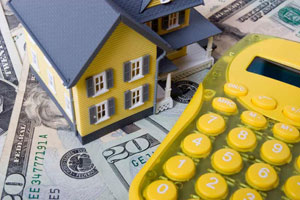VA Loan Frequently Asked Questions
By Steven Roberts Updated on 7/31/2017Why get a VA loan?
VA loans provide exceptional benefits. For instance, VA loans allow borrowers to purchase a home without a down payment, one of the few remaining mortgage loans with this characteristic.
The VA also limits the amount of closing costs which veteran borrowers pay during a home purchase, further reducing the cost of these loans. Furthermore, with no mandatory VA mortgage insurance fees, the VA mortgage program is exceptionally cheap and provides qualified veterans with incredible benefits.
How do I qualify for a VA loan?
To qualify for a VA Loan, borrowers must submit a request for and obtain a Certificate of Eligibility. Borrowers who do not already possess this document must apply using the VA Form 26-1880, which can be acquired through the lender or on the U.S. Department of Veteran Affairs website.
One of the following apply:
- You served 181 days during peacetime, Active Duty
- You served 90 days during war time, Active Duty
- You served six years in the reserves or the National Guard
- You are the spouse of a service member who died in the line of duty or because of a service related disability.
Are reservists eligible?
Eligibility for Reservists and National Guard members differs from the standard requirements that dictate VA eligibility.
What military service is not eligible for VA loan?
Veterans seeking VA financing cannot qualify based solely upon military service performed in World War I, Active Duty Training in the Reserves, or Active Duty Training in the National Guard. Note, however, that National Guard and Reservists are eligible to receive VA benefits if they activated under the jurisdiction of the title 10 U.S. Code during the Iraq/Afghanistan conflict.
What does it mean that VA Loans are guaranteed?
This just means that the loan is guaranteed to the lender in case the borrower defaults on the loan. This doesn’t mean that the borrower is guaranteed a loan. However, credit and income are still big factors.
What is the maximum VA Loan amount?
The maximum amount a veteran can borrow for a VA Loan will depend on the loan limit in which the prospective property is located. The majority of counties have a Loan Limit of $417,000.
Some counties have higher VA Loan limits, but borrowers need to keep in mind that they still have to qualify for the requested loan amount. Borrowers may not be approved for the entire loan amount even if they are eligible for the loan. If a borrower wants a home that is more expensive than the maximum VA Loan amount, he or she will have to come up with the leftover money as a down payment.
Will I need a down payment for my VA Loan?
One of the greatest features of VA Home Loans is that borrowers can take out the loan with no money down. However, if the house purchase price is greater than the county loan limit, a VA loan down payment will be required to cover the difference.
How important are credit scores when looking for a VA Loan?
The VA doesn’t approve or deny based on credit scores for a VA loan. Instead, the VA uses the last twelve months of credit history to determine a borrower’s qualification.
Whether a borrower has a high or low credit score, the only factor he or she needs to worry about their credit from the past year. Each Lender will have a minimum credit score required to qualify.
Check with your lender.
Do VA loans require mortgage insurance?
No, there is no third-party mortgage insurance with VA Loans. This is because the lender is guaranteed by the VA.
Can I get a VA Loan for a business?
Yes, it is possible, Read this article about how to acquire a VA Loan for a Business.
What are the VA loan repayment options?
VA loans types vary and offer flexibility regarding repayment plans, allowing borrowers to choose between traditional fixed-payment, graduated payment, or even growing equity mortgages, depending on which plan best suits the borrower’s financial circumstances.
Furthermore, VA mortgages do not include any prepayment penalties, allowing borrowers to pay off the mortgage sooner and consequently save money on interest payments.
What VA refinance options are available?
The VA offers several refinance options for VA mortgage homeowners, the most popular being the Interest Rate Reduction Refinancing Loan (IRRRL) and the VA Cash-Out Refinance Loan. The IRRRL, also known as a VA Streamline Refinance, refinances an existing VA Loan into a new VA Loan with a lower interest rate or from an ARM (adjustable rate mortgage) into a fixed rate mortgage.
In addition, as a streamline refinance, borrowers do not need to undergo credit or income verification to qualify. As for the latter option, the VA Cash-Out Refinancing Loan allows Veterans to take cash out of their home’s equity. To use the VA Cash-Out Refinancing Loan, borrowers must be refinancing an existing VA Loan.
Can I build a home with VA loan?
VA loans allow borrowers to both construct a home and purchase land to do so, although the plans for construction must be explicitly outlined to be performed within a particular time frame. Many veterans utilize VA home loans in order to negotiate the construction of a home using a private home construction loan, subsequently refinancing using VA home loan benefits.
Learn more about VA Loan construction loans.
Can I purchase a second home using a VA Loan?
VA guidelines specify that borrowers must occupy the property as their primary residence. However, provisions allow a veteran’s spouse to occupy the residence, though no other family members can satisfy this requirement.
Can VA loans be used to purchase property outside the U.S.?
VA loans can only be applied to properties within the United States, its territories, and its possessions, the latter including Puerto Rico, Guam, the Virgin Islands, American Samoa, and the Northern Mariana Islands.
What if I’ve already obtained a VA loan previously?
VA borrowers can restore their VA entitlement depending on the circumstances. For those who have paid off the original VA mortgage but still own the home, borrowers can perform a one-time restoring of entitlement to purchase a new property. If the borrower repaid the VA mortgage but does not own the property, he or she can restore entitlement as many times as desired, reusing VA eligibility for each home purchase.
In general, veterans who have already obtained VA loans but have not restored entitlement may still have a remaining entitlement to utilize for a new VA mortgage. However, utilizing entitlement and restoring entitlement does not occur automatically; borrowers can do so by completing another VA Form 26-1880 to request a new Certificate of
Eligibility, which will list the remaining or restored entitlement depending on the circumstances.
Does VA entitlement expire?
VA entitlement does not expire until the borrower resumes active duty. Once released or discharged from active duty, borrowers must request a redetermination of their eligibility and entitlement based on the service provided during the most recent session of active duty and the type of discharge received.
How can I restore my entitlement?
Borrowers who purchased a home using a VA mortgage and have paid off the loan in full but still own the property may perform a one-time restoration of entitlement to purchase another property.
However, under the following circumstances, borrowers who have already secured a VA home loan can restore entitlement as many times as necessary:
- The property was purchased with a VA mortgage loan and has been sold; the loan is currently being paid in full as a result.
- A VA-eligible borrower has assumed the previous mortgage and agreed to exchange his or her entitlement for the seller’s entitlement.
Do all local lenders offer VA loans?
Not all banks and lenders issue VA mortgage loans. Borrowers should select a VA-approved lender that can process the home loan transaction.
However, loan offers differ from lender to lender in terms of closing costs, fees, and interest rates; accordingly, borrowers should shop for the best mortgage rates by comparing different lender quotes and terms.

Didn't find the answer you wanted? Ask one of your own.
-
 VA Loan Information
View More
VA Loan Information
View More
-
 Can I get a VA Loan after Short Sale or Foreclosure?
View More
Can I get a VA Loan after Short Sale or Foreclosure?
View More
-
 Comparison: VA Loans Versus Conventional Mortgages
View More
Comparison: VA Loans Versus Conventional Mortgages
View More
-
 Benefits of Refinancing With a VA Mortgage
View More
Benefits of Refinancing With a VA Mortgage
View More
-
 VA Loan Modification
View More
VA Loan Modification
View More
-
 Approval of VA Lenders
View More
Approval of VA Lenders
View More
-
 VA Loan Forgiveness - Debt Forgiveness for U.S. Veterans
View More
VA Loan Forgiveness - Debt Forgiveness for U.S. Veterans
View More
-
 VA Loan Down Payment
View More
VA Loan Down Payment
View More
-
 Securing a VA Business Loan
View More
Securing a VA Business Loan
View More
-
 VA Loan Benefits
View More
VA Loan Benefits
View More
-
 VA Loan Appraisals and Home Inspection
View More
VA Loan Appraisals and Home Inspection
View More
-
 Understanding the VA Loan Application Process
View More
Understanding the VA Loan Application Process
View More
-
 5 Common Obstacles to VA Home Inspection
View More
5 Common Obstacles to VA Home Inspection
View More
-
 Understanding the VA Construction Loan Process
View More
Understanding the VA Construction Loan Process
View More
-
 VA Loan Closing Costs
View More
VA Loan Closing Costs
View More

Contributing Authors
Get a Free Quote! Get a VA Loan!
Related Articles
Ask our community a question.
Searching Today's Rates...

Featured Lenders
Cameron Burke
Vision One Mortgage
Huntington Beach, CA
Lisa Stepp
RBS Citizens
Clifton Park, NY
Kat Whitman
Whitman Met, Inc.
Sacramento, CA



